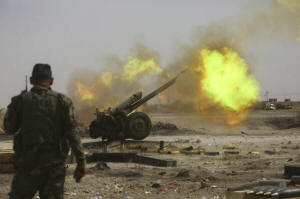|
Iraqi forces launch operation to seize
last Islamic State enclave in Mosul
 Send a link to a friend
Send a link to a friend
 [May 27, 2017]
By Maher Chmaytelli and Isabel Coles [May 27, 2017]
By Maher Chmaytelli and Isabel Coles
BAGHDAD/MOSUL, Iraq (Reuters) - Iraqi armed
forces launched an operation on Saturday to capture the last Islamic
State-held enclave in Mosul, according to a military statement.
The fall of the city would effectively mark the end of Iraqi half of the
"caliphate" declared nearly three years ago by Islamic State leader Abu
Bakr al-Baghdadi, which also covers parts of Syria.
The Iraqi air force dropped leaflets on Friday urging residents in the
enclave to flee, although humanitarian groups fear for the safety of
civilians trying to escape.
The enclave covers mainly the Old City center and three adjacent
districts alongside the western bank of the Tigris river.
The U.S.-backed offensive on Mosul, now in its eighth month, has taken
longer than planned as the militants are dug in among civilians,
fighting back with booby traps, suicide cars and motor-bikes, snipers
and mortar fire.
"The joint forces have began liberating the remaining districts," said
an Iraqi military statement.
Desperate civilians trapped behind Islamic State lines now face a
harrowing situation with little food and water, no electricity and
limited access to hospitals.

The push inside the Old City coincides with the start of the holy
fasting month of Ramadan. Its prime targets is the medieval Grand
al-Nuri mosque and its landmark leaning minaret where Islamic State's
black flag has been flying since mid 2014.
The forces hope to capture in the next few days the mosque where
Baghdadi revealed himself to the world and announced the "caliphate"
that also spans part of Syria.
Residents in the Old City sounded desperate in telephone interviews made
over the past few days.
"We're waiting for death at any moment, either by bombing or starving,"
one said, asking not to be identified for his own safety. "Adults eat
one meal a day, either flour or lentil soup."
The United Nations expressed "deep concern" for the hundreds of
thousands of civilians trapped behind Islamic State lines, in a
statement on Saturday from the organization's under-secretary general
for humanitarian affairs, Stephen O'Brien.
"Although the U.N. is not present in the areas where fighting is
occurring, we have received very disturbing reports of families being
shut inside booby-trapped homes and of children being deliberately
targeted by snipers," he said.
[to top of second column] |

Popular Mobilization Forces (PMF) fire towards Islamic State
militants during a battle on the outskirts of Al-Ba'aj, west of
Mosul, Iraq May 26, 2017. Picture taken May 26, 2017.
REUTERS/Stringer

The militants have laid sheets of corrugated metal over pebbles in
the alleys as an early warning system, residents said. The grinding
noise produced by treading on it would alert them to any troop
movements or civilians trying to escape.
The United Nations last week said up to 200,000 more people could
flee Mosul as fighting moves to the Old City.
Residents said millet, usually used as bird feed, is being baked
like rice as food prices increased ten fold. People were seen
collecting wild mallow plants in abandoned lots and also eating
mulberry leaves and other types of plants.
About 700,000 people, about a third of the pre-war city's
population, have already fled, seeking refuge either with friends
and relatives or in camps.
Iraqi Prime Minister Haider al-Abadi had initially hoped Mosul would
be retaken by the end of 2016.
The insurgents are also retreating in Syria, mainly in the face
U.S.-backed Kurdish-led forces.
The insurgency is expected to continue in the sparsely populated
desert region along the Syrian border even if Mosul is fully
captured.
Iranian-backed Shi'ite paramilitary forces are fighting Islamic
State in that part of the country where Baghdadi is believed to be
hiding, according to U.S. and Iraqi officials.
(Additional reporting by Ahmed Rasheed in Baghdad; Writing by Maher
Chmaytelli; Editing by Toby Chopra)
[© 2017 Thomson Reuters. All rights
reserved.]
Copyright 2017 Reuters. All rights reserved. This material may not be published,
broadcast, rewritten or redistributed.
 |